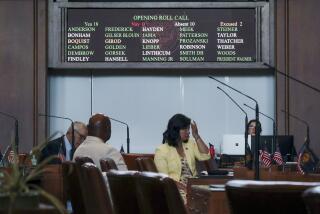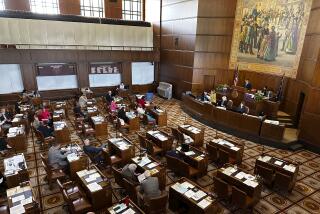Sunni lawmakers return to Iraq parliament, apologize for walkout
- Share via
Reporting from Baghdad — Iraqi lawmakers buried the hatchet Saturday, with public displays of goodwill and apologies over “misunderstandings,” as parliament approved a broad agreement that will usher in a new government after a debilitating eight-month deadlock.
Two days after they walked out of a raucous session that showed the deep rifts in the halls of power, members of the Sunni Arab-backed Iraqiya bloc returned to parliament for a final vote on the accord that saw Shiite Prime Minister Nouri Maliki maintain his hold on power.
Iraqiya members apologized for walking out Thursday after the Shiite and Kurdish blocs in the parliament refused to go along with a request for an immediate lifting of a political ban on four Iraqiya members because of their alleged ties to Saddam Hussein’s Baath Party.
Lawmakers agreed Saturday to start the process of lifting the bans. The 325-member body also voted in favor of the agreement, hammered out last week, that proved to be the breakthrough in ending the stalemate over inconclusive national elections.
The agreement’s contours, mapped out in nine documents, include promoting reconciliation, power-sharing; devolving the powers of the prime minister’s office, empowering the Cabinet and a timeline for ending the process of purging suspected Baath members from government.
But Saturday’s session could be a fleeting “kumbaya” moment. The weeks ahead are sure to be stormy as the sides brawl over the meaning of the often vague language of the agreement.
In fact, even as the sides celebrated the end of the political crisis, the head of Iraqiya, Iyad Allawi, muddied the waters.
Allawi, whose bloc won 91 seats in the March 7 elections, the single largest slate in the parliament, threatened to serve in the opposition and not join the government as the head of a new body, the National Council for Strategic Policies. U.S. officials had pushed the idea as the way for Allawi to have a major political role.
And in an interview with CNN broadcast Friday, Allawi belittled the new unity government. “We think the concept of power-sharing is dead now,” the secular Shiite Muslim politician said. “It’s finished.”
Around Baghdad, Iraqis were relieved that the parliament had overcome its tiff. Some professed optimism.
“I think Maliki will be successful,” said Felah Abood Qasim, who cast his ballot for Allawi. “Maliki has a sort of bravery. He can take decisions. He knew how to play it during these eight months. He made all his rivals have less success than him, if not failure!”
Others were disillusioned, lamenting the wasted time of the last year and the return to power of Maliki and President Jalal Talabani, a Kurd.
“Nothing was changed: The president is the same, the prime minister is the same,” said Aboud Ahmed, a 41-year-old computer technician in the Shiite holy city of Najaf. “All these faces are the same and we are always the victims.”
Salman is a Times staff writer.
Times staff writer Jaber Zeki in Baghdad and special correspondent Saad Fakhrildeen in Najaf contributed to this report.
More to Read
Sign up for Essential California
The most important California stories and recommendations in your inbox every morning.
You may occasionally receive promotional content from the Los Angeles Times.










